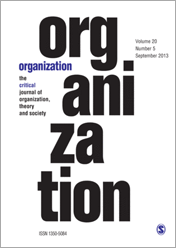Forget “Business as Usual”
As the evidence of climate change mounts, <link people gail-whiteman>Professor Gail Whiteman says managers must reimagine business.
Text Bennett Voyles

For some time now, most businesses have put environmental sustainability on an ever-growing list of laudable corporate social responsibility goals. Some have even made serious efforts to achieve that aim.
But the recent spate of extreme storms, and the serious decline in Arctic summer sea ice volume, suggests to Gail Whiteman that good intentions are no longer enough. Although individual weather events cannot be tied directly to climate change, Whiteman says that the trend should be seen as a warning that the world must take more effective action to reduce emissions.

As the damage of climate change continues to rise, managers can no longer be content to “reduce, reuse, and recycle,” says Whiteman, Professor of Sustainability, Management and Climate Change at RSM and part time Professor in-Residence at the World Business Council for Sustainable Development (WBCSD). The scale of the emergency is now so enormous that becoming a sustainable business is no longer an optional goal but a requirement for human survival.
“The real issue here is about how do you imagine the future as a manager? Because the way you imagine and frame the issue of climate change really influences the way your organization will develop ways to deal with it,” she says.
But is that a challenge companies can meet? “It is possible,” she insists. “Impossible just means it would have economic consequences that particular executives don’t want….What is possible or what is impossible depends on how you imagine the future.”
In a recent special issue of Organization, a leading management journal, Whiteman and her fellow guest editors took their case for radical action to business management theorists and featured articles written by a number of people that Organization readers don’t usually hear from, including an environmental activist, a climatologist, and a former head of Greenpeace.
Bill McKibben, a leading environmental author and activist; Michael Mann, a professor of meteorology at Penn State University and a leading climatologist; and Paul Gilding, a former global CEO of Greenpeace and the author of The Great Disruption (Gilding, 2011), now an environmental advisor to some of the world’s largest corporations, were among the authors featured in the special issue.
Their goal, the editors wrote, was to “highlight the increasingly political nature of organizing responses to climate change, and at the same time demonstrate the need for collective imaginings of how to solve an issue that will define the totality of human organization in coming decades.”
In their own contribution to Organization, “Future imaginings: organizing in response to climate change,” Whiteman and her co-editors note that climate change will create not only physical threats such as more extreme storms, forest fires, and droughts but multiple challenges to the economic, political, and social order. They argue that for humanity to survive, managers will need to forge an entirely new path that doesn’t involve “escalating greenhouse gas emissions and economic growth.”
But by and large, this rethinking has not happened yet, the authors say. Whiteman and her co-authors see a fundamental disconnect between the projections of impending catastrophe as temperatures rise and the continuation of fossil-fueled business as usual. Governments pledge reductions in greenhouse gas emissions and businesses promote sustainability, but emissions keep on rising. They argue that the problem stems from the fact that people have considered climate change primarily as a natural problem that requires a rational scientific response. But to truly come to grips with the problem, they contend, people will have to learn to think in an entirely different way, and go beyond what they describe as “the capitalist imaginary of unlimited expansion of production and consumption.”
Whiteman and her co-authors believe that most of us are trapped in what Blake described as “mind-forg’d manacles” that prevent people from reacting to the enormity of the changes our planet is now undergoing. They argue that even corporations’ attempted solutions to the climate problem still frame it as a problem that can be solved through more consumption, such as hybrid engines and office recycling. Even among their fellow scholars, climate change “remains at best a fringe topic within the social sciences academy.”
Instead, they suggest, we need to respond to climate change in a much deeper and more profound way than by trying to cure a side effect of capitalism with more capitalism. “In other words, we must allow the increasing disruption…of climate change to truly disrupt us…’ they write.
What they call the imaginaries – the dreams and aspirations that knit society together – need to be reimagined by society in a way that makes it possible for society to fulfill this new social need. “No amount of extra scientific information about climate change can make an impact on their life planning and political choices if their imagination is not engaged, and if our sensemaking abilities are not actively engaged,” the co-editors believe.
The traditional profit-oriented business model isn’t inevitable, in their view. “Too often people forget that our current socio-economic system came into being because human beings have imagined it, and they often feel powerless to intervene,” they write. But it can be changed. The future needs not be simply our present way of life “stretching all the way to infinity, give or take a few new electronic gadgets”.
They note that another contributor Lê (2013) found that resource companies involved in exploiting the Athabasca tar sands in Canada have still not renounced the expansion of fossil fuel extraction from that wilderness “and its concomitant environmental destruction.” But they’re not alone: even a number of more progressive companies still cling to traditional conceptions of capitalist production. For example, they mention another contributor (Garland et al.) who looks at how Toyota’s Prius advertisement presents the solution to the threat of consumption-caused climate change as more consumption.
A number of authors in this special issue of Organization have tried thought experiments to try to break people out of their sense of limited possibilities for change. One that the co-editors note approvingly are the parallels that one article (Gosling and Case) draws between the cultural collapse of indigenous Americans facing the catastrophe of European colonization and the threats humanity now faces because of climate change.
Whiteman insists the intent is to get business to take a harder look at what a world that is two or more degrees warmer will be like – and then respond. “We are facing a grand challenge, and we have to rise to the occasion,” she says.
A number of companies are already working to meet the challenge:
- Unilever. The global consumer giant’s strategy for sustainable living is “very visionary,” Whiteman says. The company aims to double its revenue even as it reduces its environmental footprint and increases its positive social impact.
- Puma. The German athletic and casual footwear company has actually released the first corporate environmental profit and loss statement, calculating the company’s overall impact on the planet.
- The B Team. Richard Branson, the founder of the Virgin Group, and Jochen Zeitz, former CEO of Puma, are leading a group of companies who describe themselves as dedicated to delivering “a Plan B that puts people and planet alongside profit.”
“It’s not pie in the sky,” Whiteman says.
| Access the special issue of Organization, "Future Imaginings: Organizing in Response to Climate Change," edited by Christopher Wright, Daniel Nyberg, Christian De Cock and Gail Whiteman, at Sage Journals. |




